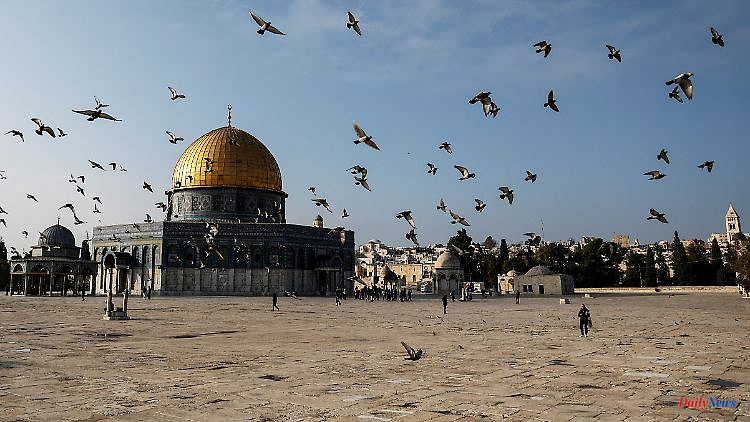Hamas should "understand that a different time has dawned," Israel's new security minister Ben Gvir said. His visit to the Temple Mount raises concerns about a new escalation in the region. Several Arab countries are protesting. And Washington also finds clear words.
With his visit to the Temple Mount in Jerusalem, which is sacred to both Jews and Muslims, Israel's new right-wing extremist Security Minister Itamar Ben Gvir fueled fears of a renewed escalation of violence between Israelis and Palestinians. Several Arab states condemned the visit as "reckless" and warned of the consequences for "security and stability" in the entire region. Meanwhile, Israeli Prime Minister Benjamin Netanyahu has confirmed the "status quo" on the Temple Mount.
Israel's new ultra-right government will "not give in to a vile and murderous organization," said Ben Gvir, explaining his previously announced controversial visit to the holy site. The radical Islamic Palestinian organization Hamas had previously described Ben Gvir's visit plans as "the prelude to an escalation in the region".
According to the guards of the Jordanian Wakf, Ben Gvir was accompanied by Israeli security forces, and a drone also flew over the Temple Mount. The Wakf is the Jordanian foundation that manages the Temple Mount compound.
The visit plans of the new Minister for National Security had already triggered fears that violence could escalate again. A Hamas spokesman then described Ben Gvir's visit as a "crime". He declared that the Palestinian people "will continue to defend their holy places and the al-Aqsa Mosque". The Palestinian Foreign Ministry in Ramallah called the visit an "unprecedented provocation".
The United States and several Arab countries also sharply condemned Ben Gvir's visit. Washington has "made it clear to the Israeli government that it opposes any action that might affect the status quo at the holy sites," said US Ambassador to Israel Tom Nides.
According to its foreign ministry, Jordan summoned the Israeli ambassador in Amman to deliver "a protest note about the minister's ruthlessness". Egypt, which acts as a key mediator in the Gaza Strip, warned of the "negative consequences of such actions for security and stability" in the Palestinian territories and the wider region.
Saudi Arabia, which is home to two of the holiest Muslim sites, Mecca and Medina, also condemned Ben Gvir's "provocative practices". The United Arab Emirates (UAE), which established diplomatic relations with Israel in 2020, "strongly condemned" his visit.
Prime Minister Netanyahu's office said the prime minister was "determined to maintain strictly and unchanged the status quo at the holy site."
Judaism reveres the Temple Mount as its holiest site. For Muslims, the hill with the Dome of the Rock and the Al-Aqsa Mosque is the third holiest site after Mecca and Medina. The Temple Mount is under Muslim administration. To avoid provocation, non-Muslim visitors are allowed to visit at certain times, but not to pray there. The Israeli police monitors the security of the site. However, nationalist Israelis deliberately break the prayer ban time and again.
In 2000, the visit to the Temple Mount by the then Israeli opposition leader and later head of government Ariel Sharon was followed by violent clashes in which the Israeli police shot and killed several demonstrators. The outbreak of violence is seen as the beginning of the so-called second Intifada, a Palestinian uprising that lasted until 2005. In May 2021, an outbreak of violence in East Jerusalem, particularly on the Temple Mount, marked the start of an 11-day war between Hamas and Israel.
"We maintain freedom of movement for Muslims and Christians, but Jews will also go to the Temple Mount," Ben Gvir said. Those who issue warnings should be "treated with an iron fist". Hamas should "understand that a different time has dawned," Ben Gvir tweeted.
The 46-year-old is one of the most radical and controversial members of the new, right-wing Israeli government under Netanyahu, which was sworn in at the end of December. Ben Gvir has repeatedly been accused of intentionally fueling tensions with the Palestinians.












